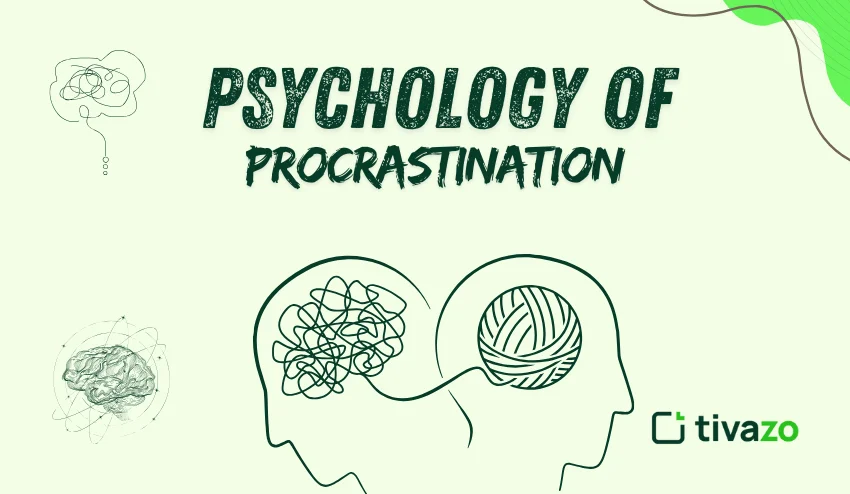Workplace or employment procrastination is a complicated psychology of procrastination phenomenon where employees defer tasks, all while knowing it could lead to unfavorable consequences. Procrastination is more than poor time management; instead, it is intimately connected with emotional and cognitive experiences that impact an employee’s approach to work. Many employees procrastinate because they feel overwhelmed with the size or scope of a project, experience anxiety, and avoid work altogether. Others procrastinate work because they are worried about failing, are perfectionists, or have low self-efficacy. Emotional responses such as stress, boredom, or lack of motivation are also substantial contributors to procrastination
Once someone identifies a delaying behavior, the first step in overcoming the pattern of delaying behavior is to know the psychology of procrastination. Once the employee understands the triggers or patterns of delaying work, they can implement interventions that manage emotional reactions/feelings, increase focus, and improve time management activities. Over time, if employees begin to recognize and reflect on the psychological side of delaying behaviors, they can begin to change their procrastination behavior. Over time, they can expect increased productivity, lower and less frequent stress levels, and a greater sense of professional accomplishment.
What Leads To Employee Procrastination
Many factors, especially psychological, could lead to procrastination at work:
Fear of Failure: Some employees may avoid tasks altogether to avoid making a mistake that impacts their performance and reputation. This fear becomes heightened when the task is more visible for the supervisor and peers; the stakes are higher. Understanding procrastination from a psychology of procrastination perspective can assist employees in understanding that avoidance is a normal reaction to anxiety and does not reflect an individual’s moral character.
Perfectionism: The desire to excite anything perfectly may lead to delays, as these employees may spend significant time planning or reworking tasks, which leads to procrastination.
Low Self-Efficacy: When an employee does not believe in his/her skills or abilities, some tasks can seem overwhelming or unmanageable. Employees who lack self-efficacy tend to procrastinate on a task because they expect it to be hard or to fail, not because they haven’t broken it down into smaller tasks.
Habituation: Some employees avoid certain tasks because they dislike them, so they will focus on tasks they enjoy and find easier. The psychology of procrastination states that all people prefer to avoid tasks that elicit some emotional pain, and they try to focus on easier or more enjoyable work.
Present Orientation: Present-oriented employees prefer immediate gratification to those goals and responsibilities further out in time. For example, being on social media, easy jobs, or semestral tasks are more enjoyable immediately and typically lead to procrastination in work.
Decision Fatigue: The mental toll of making frequent decisions can tire employees and cause them to delay important decisions and other work. Understanding the connection between decision fatigue and the psychology of procrastination can help organizations better organize workloads.
Lack of Accountability: Limited or absent oversight or check-ins can increase feelings of pressure on employees to complete tasks on time, which may allow for procrastination at work.
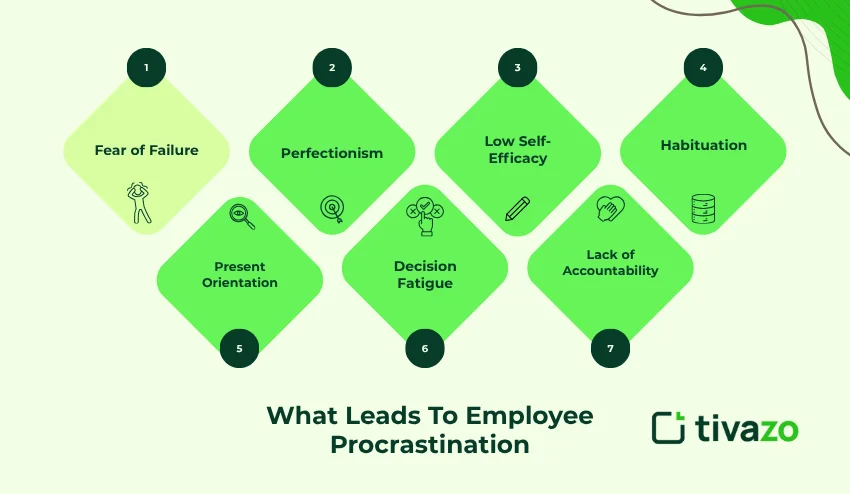
Relating these drivers to the psychology of procrastination gives both the employee and manager strategies to alleviate procrastinating behavior, assist productivity, and engage with satisfaction in the workplace.
4 Most Common Triggers of Employee Procrastination
Procrastination in the workplace frequently comes from:
Unclear Expectations
Lack of information concerning how a task should be carried out, or ambiguity around deadlines and responsibilities, can certainly cause employees to delay the beginning stages of the work process. Ambiguous expectations will trigger procrastination to postpone tasks, and the psychology of procrastination agrees that there is fear of judgment or making unacceptable mistakes created by the unknown. Just as any good manager should, generously clarify the conditions of a task or assignment, so employees can spend less time procrastinating and more time productively working.
An Overwhelming Workload
Employees who have too many tasks assigned to them will begin to feel stress or indecision about what to prioritize and focus on. Overwhelmed and overloaded employees will procrastinate completing important customer service tasks or all task completions. The psychology of procrastination refers to feeling overloaded = anxiety = impossible to make decisions about the importance or priority of the tasks. Taking important tasks and breaking them down into smaller tasks can help minimize the experience.
Lack of Motivation or Incentive
Without a level of valuable experience, reward, or recognition, an employee won’t feel compelled to dedicate valuable time and effort toward completing a project. The psychology of procrastination suggests motivation is the primary driver of starting and finishing work. Providing some level of beneficial incentive and recognition of completion can help eliminate a delay in task completion.
Distractions In The Workplace
A noisy office, distractions, and interruptions from both employees and staff in meetings, and digital distractions are disheartening and unproductive. The psychology of procrastination states that if employees are judged or picked apart about a condition, meaning to minimize distractions, you will have employees more readily eliminate distractions, only to be more productive.
Organizations can use the psychology of procrastination to understand triggers like intermittent reinforcement to create mechanisms to help employees mitigate postponements and maximize productivity based on the employees’ conditional preferences.
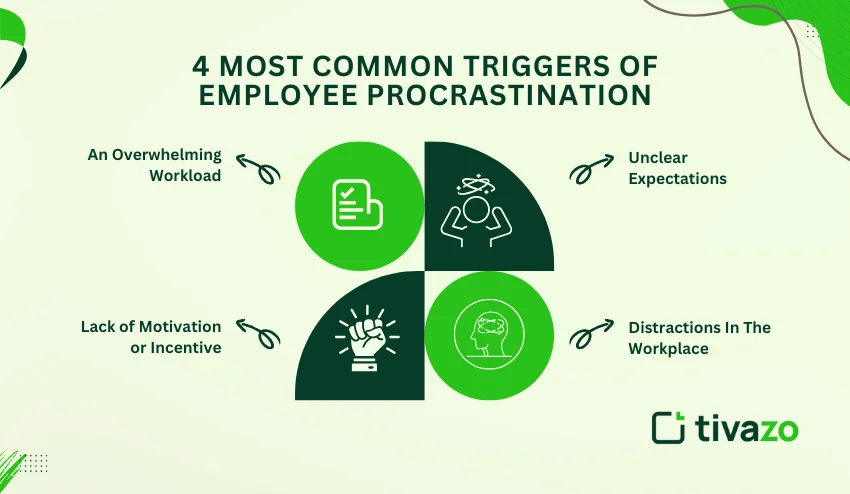
The Adverse Effects of Procrastination on Employment
Procrastination in the workplace can have devastating effects, namely:
Reduced Productivity. Delaying project work leads to rushed processes, missed deadlines, and low-quality work. Regular procrastinators often do not complete work in an orderly fashion, thereby limiting productivity for the team as a whole.
Increased Stress and Burnout. Completing a task at the very last minute generates stress, fatigue, and job dissatisfaction for the future. The underlying psychology of procrastination shows that the stress of the time approaching the deadline can affect both mental and physical health and decrease performance (job performance).
Harmful to Professional Reputation. Procrastinating repeatedly can limit credibility and growth opportunities. A co-worker or supervisor may see someone as unreliable if they constantly put things off for no reason, and this creates barriers to taking on more projects or various leadership roles.
Negative Effects on Team Performance. If just one person in the team is lengthening the project process by his or her procrastination, this can affect the rest of the productivity and professional relationships, leading to distrust and inefficiencies. If one person who is lazy on the project procrastinates, others on the team may not be as pleased with doing more work because of someone else’s fault.
Negative Effects on Employee Mental Health. Being a chronic procrastinator is associated with workplace stress, anxiety, and job dissatisfaction, producing suicidal thoughts, guilt, and self-doubt. When any employee feels this way, this may circularly increase the psychology of procrastination.
Missed Opportunities: People who procrastinate can miss the chance to submit work on an important project, promotions, or opportunities for training and development at work. Research in applied psychology, which studies procrastination, helps with recognizing these types of patterns early and determining the proper intervention strategies an individual could use to help prevent the habitual adverse outcomes of procrastination to themselves, others, and the organization.
Understanding organization-wide implications of procrastination is crucial for the organization, managers, and employees to address the psychology of procrastination and be more proactive in identifying and addressing it to promote more productive and healthier employees and workplace environments.
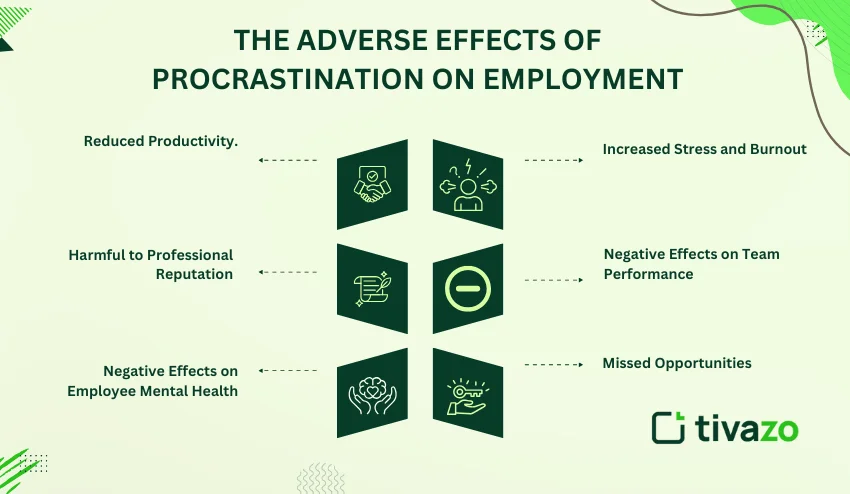
Effective Ways of Combating Employee Procrastination
1. Embrace the 5-Minute Rule
Sometimes just getting going can feel daunting. Encourage employees to work on a task for just five minutes. Often, this slight commitment helps lower the mental barrier to getting started on the task and makes it easier for the employees to continue once they begin to build momentum!
2. Break Up Work into Smaller Steps
It is difficult for any employee to take action on a larger project. Projects can be overwhelming in general. Breaking up the project into smaller bits of work can help employees take more consistent action while also feeling their work is helping them accomplish more overall.
3. Use Time Management Techniques
Using different time management techniques, like the Pomodoro technique (working for 25 minutes, taking a 5-minute break), can help employees manage their focus, fatigue, and improve productivity.
4. Reduce Workplace Obstacles
Encourage employees to minimize distractions. Employees can shut off notifications, close windows, or even designate a work workspace to optimize focus in the moment.
5. Provide Clear Goals and Timelines
Providing goals, deadlines, or clear deliverables gives employees clarity on what to focus on and accountability for moving forward. Having a good understanding of what they are being held accountable for or what they may accomplish reduces hesitancy and procrastination.
6. Promote Self-Compassion and Positive Self-Talk
Employees can rarely get past their fear of making mistakes and being perfect if they hold critical thoughts against themselves. An environment that can foster positivity and limit criticality can help employees be able to work on tasks without undue or excessive pressure.
7. Ask for Employee or Management Help
Managers can guide employees, coach them through the process, or share resource tips for employees that struggle with the psychology of procrastination. An employee can talk to a workplace psychologist, workplace consultants, EAP programs, or other professionals to support strategic interventions to improve.
What is the 5-Minute Rule for Employee Procrastination?
The 5-Minute Rule is an easy technique where employees agree to work on a task for only five minutes. This psychology of procrastination strategy helps people get past their first resistance and begin working on the task. In doing so, the psychological barrier to starting is decreased, and frequently, employees will work beyond the five minutes, thus increasing their level of productivity and engagement.
This method works because it shifts the task from finishing the entire project to simply getting started. By reducing overwhelm, employees can start gaining momentum, building up their confidence, and most of the time, they will work several minutes past that initial five minutes, putting their focus and energy into the task of psychology of procrastination.
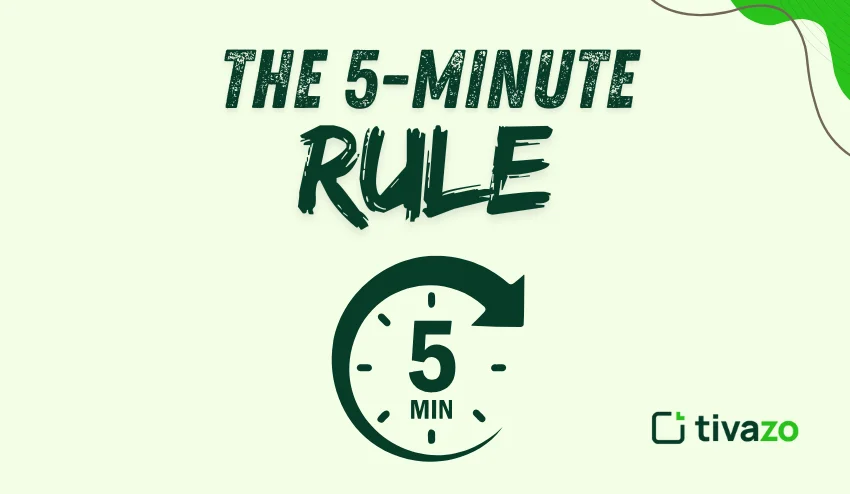
Conclusion
Psychology of Procrastination in the workplace is enlightening to learn about since procrastination isn’t merely a matter of poor time management; it is based on emotional, psychological, and environmental issues. Employees put things off because they fear failure, want things to be perfect, lack confidence, don’t always understand their role or responsibilities, or possibly have an overwhelming workload. The implications can include a lower level of productivity, increased pressure or anxiety, negative perceptions from others, and less effective teams.
Most importantly, organizations and managers can help minimize procrastination by consulting with employees about the causes of their Psychology of procrastination. Then, organizations can use some recommended techniques, such as setting SMART goals, breaking down longer tasks into small chunks, considering distractions, or using the 5-minute rule, to combat procrastination in employees. By providing a considerate and well-informed working environment, this can also promote motivation, concentration, and well-being, which can lead to better performance and satisfaction in their role.
